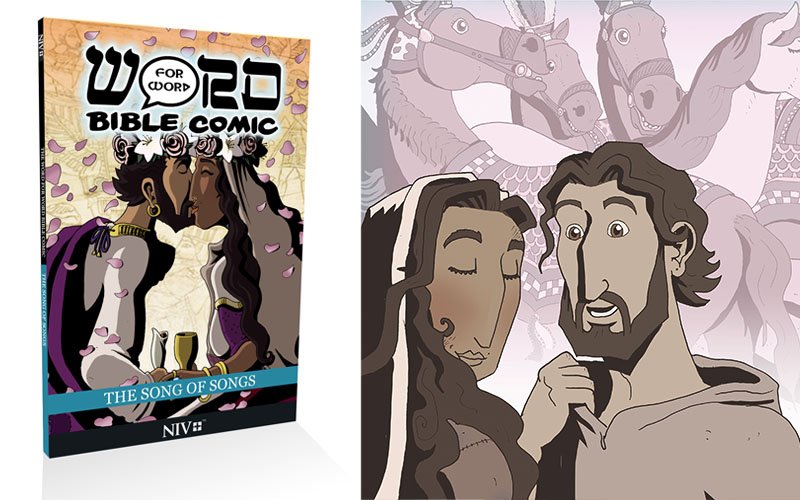What is the Three-person interpretation is the Song of Songs?
The interpretation depicted in the comic is one of three main ways to interpret the Song of Songs and its meaning. The three interpretations are sometimes called the three-person narrative, the two-person narrative (illustrated) and the no-narrative views.
In the three-person narrative, the shepherd and King Solomon are not the same person. The idea is that the girl is intended to be married to the rich and powerful King but is already in love with the common shepherd who is her true love. Later Solomon (who is the villain of the piece) comes and takes her away to make her his bride. She twice escapes the palace by night and seeks her love, and then at the end, the two run away together.
At the opening of the book, she talks about kissing her love and says "Take me away with you—let us hurry!" which is taken to indicate that she wishes to escape (1:4). The following half of the verse can be taken in two ways, either "Let the king bring me into his chambers" indicating that she is keen for the king to be the one to take her away from her life of toil, or "the king has bought me into his chambers”, which could be understood as her having little choice and thus is calling for a saviour.
In the song, the maiden seems to go into the town at night on two occasions to seek out her lover. The three-person view heavily rests on the idea that she is escaping the royal palace at night to meet her true love, the shepherd. Proponents of this view point to the guards beating her as evidence that she is not where she should be (5:7) and the Daughters of Jerusalem saying “how is your beloved better than others, most beautiful of women? How is your beloved better than others, that you so charge us?” (5:9) as evidence that her beloved cannot be, therefore, the King who is famous. In my study of this book, I am not persuaded by this argument, however, because her second trip into town is not an actual event but part of a dream she is recalling as she says at the beginning of the tale "I slept but my heart was awake”. (5:2)
In the three-person interpretation, the verse "Solomon had a vineyard in Baal Hamon; he let out his vineyard to tenants. Each was to bring for its fruit a thousand shekels of silver. But my own vineyard is mine to give..." (8:11) implies that Solomon is not who she is speaking to, as he is named in the third person tense and that she is saying her vineyard/love is her own and she will give it to the one she loves (the shepherd). Again, the following verse can be taken in two ways "...the thousand shekels are for you, Solomon" could indicate that she is speaking to Solomon and that although she could choose to give her love to whom she pleases, it pleases her to give her love to the King. The other interpretation is that Solomon let out his vineyard (his sexuality and person) to "tenants" (i.e. the thousand women of his royal harem) and "...the thousand shekels are for you, Solomon” means the “the thousand women are for you” but my vineyard will go to whom I love.
At the end of the book, she says "Come away, my beloved, and be like a gazelle or like a young stag on the spice-laden mountains" and this is taken to mean that she runs away with her shepherd. (8:14)
If this view was the correct interpretation, the moral of the book is supposed to be that one should follow their emotions, marry for love and not be seduced by wealth and status (marrying a king). This sounds like a good moral today but, I believe that the fact she says “the king has bought me into his chambers” (1:4) and later, when Solomon is crowned with a wedding crown (3:11) implies that she marries the king or is at least engaged, though it is not explicitly stated. In ancient Israel, even a betrothal was as sacred as a marriage, and for an engaged woman (or a married woman) to run off with another man was considered adultery. Despite the fact that Solomon having dozens of wives and concubines also doesn’t fit with the biblical ideals of a monogamous marriage, it seems more likely to me that this song is, nevertheless, about the love and marriage of Solomon to this maiden, as in verse 6:8 he says “Sixty queens there may be, and eighty concubines, and virgins beyond number; but my dove, my perfect one, is unique, the only daughter of her mother, the favorite of the one who bore her. The young women saw her and called her blessed; the queens and concubines praised her.”
————————
Thanks for reading this article, the Song of Songs graphic novel is available to buy now via our online store.


